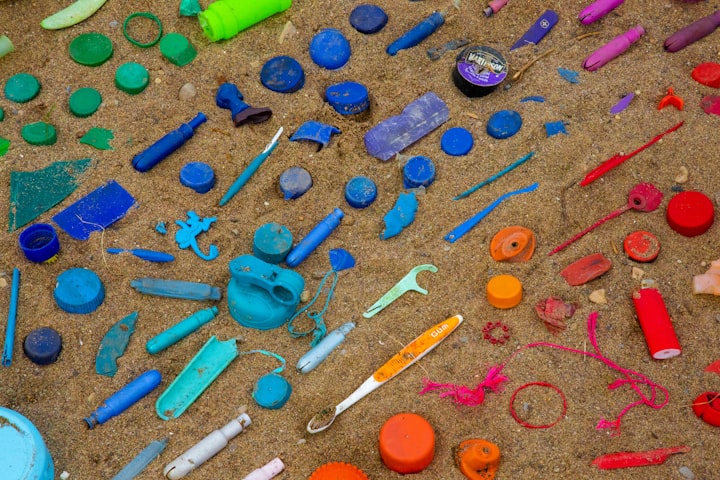We Need to Talk About Our Plastic Problem
Our Oceans Need Our Help - Here's Why:

It was 2007. A teacher silenced my boisterous class in our shabby classroom. Exhausted, she pleaded with us to pay attention. The lesson was on The Great Pacific Garbage Patch, a recent discovery by Charles J. Moore. After ten years, it had finally gained public traction.
In a last-ditch effort to teach us, she provided a single sobering fact: the garbage patch is the size of Texas and growing. The room stilled as we tried to comprehend the sheer size of it.
The fact stuck with me, as I'm sure it did with many others across the globe. Around the turn of the century, we were inundated with stories on plastic in our oceans. News segments, articles, tv shows, and school assemblies hammered it into our heads. It was a horrifying thought that we could collectively do so much to damage our one and only planet.
Then, the initial horror of it subsided, and talks stagnated. The fact hung in the air among our clouds of smog and, there, it became dormant. Blips of updates passed in the breeze; a breakthrough in trash collection was invented, a new company was founded with an idea for a solution.
As soon as potential solutions appeared, we stopped caring. We resigned ourselves to recycling a bit more and picking up litter. It was being taken care of. Scientists were making headway, and we were acting more conscious. However, an entirely different story was playing out under our noses. Instead of approaching victory, we were caught in a losing battle. Even with all the heroic efforts to save our oceans, the problem had only gotten depressingly worse.
An Expanding Island of Debris
Despite the invention of trash trawlers and the rapid speciation of ocean-aid charities, the estimated size has doubled since 2007. The patch is now twice the size of Texas and almost three times the size of France. Conservative estimates have found that there are now roughly 1.8 trillion pieces of plastic, weighing about 80,000 metric tons. Plus, the size is increasing exponentially.
The Plastic Archipelago
The plastic waste in our oceans isn't confined to the GPGP. Every year, 8 million metric tons enter our oceans; only about 25% of it ends up in the North Pacific patch. Since 1997, scientists have discovered four other plastic islands. The GPGP is the most well-known because of its size, but plastic and other debris are gathering in every ocean gyre on Earth.
--
Plastic Island Quick Facts:
GPGP: 1.6 million km² | Discovered in 1997
North Atlantic: Unknown Size | Discovered in 2009
Indian: 5 km² | Discovered in 2010
South Pacific: 2.6 km² | Discovered in 2011
South Atlantic: 0.7 km² | Discovered in 2017
--
Though trash is most concentrated in these gyres, debris can be found throughout the ocean. In 2019, scientists even found a plastic grocery bag 36,000 feet below the ocean's surface in the Mariana Trench, the deepest ocean trench on Earth. Plastic islands emerging in our ocean's gyres is merely a symptom of how saturated our oceans are with our garbage.
Why it Matters
At this point, you've likely seen the images of plastic in the stomachs of seabirds and the videos of rescuing animals stuck in soda rings. Though these examples are persuasive on their own, scientists have since discovered that the effects of ocean plastic are much broader and much more directly damaging to every human on Earth.
Many cities and countries rely on tourism to keep their economies afloat. Places like Bali, Indonesia, have already experienced the effects of plastic damaging this precious source of income. Tourism is their largest industry and, when plastic accumulated near their shores, the people began to worry their primary source of income would vanish. In 2017, the city declared a plastic emergency, intent on saving both their pristine beaches and their peoples' livelihoods. The cleanup is still underway, and many experts fear that they will never be able to keep up with the constant influx of plastics from the ocean.
Other locations around the globe rely on the fishing industry for both sustenance and income. Already, in countries like Scotland, fishermen are pouring their incomes into boat repair, as marine plastics are wearing down rudders, propellers, and even fishing nets. Scottish fishers are losing an average of $24,000 a year because of time lost and repair costs. As restoration is more commonly needed globally, it will likely decrease the amount of fish available in markets. In locations that use fish as a primary source of food, starvation will likely become more common.
And, no matter where you are on the globe, unintentionally ingesting plastic is no longer avoidable. If you've had seafood, drank water, or breathed recently, you've put microplastic into your system. Scientists have yet to determine what effects this will have on us or just how much microplastic we're storing in our bodies. Still, we've likely all been affected, and plastic in our oceans is exacerbating the problem.
We have collectively caused a plastic emergency and are, together, standing on the cliff edge of disaster. For your sake, for the sake of your children and grandchildren, and the sake of humanity, we must act.
What Can We Do?
To make a change you wish to see, speak that change into action—your words matter. Bring a concept to the forefront of a few minds and, before you know it, you've begun a chain reaction of dialogues. Speak - and write - with passion, and your thoughts will spread like wildfire.
This problem is greater than any one of us, or even any one country. We have collectively caused this damage and must now work collectively to find sustainable solutions for the sake of our future. To save our oceans, we must make it clear to our respective leaders that we care about Earth, our ecosystems, and the health and wellness of our planet. We must become advocates for better recycling programs, better waste management, and more comprehensive maritime incentives & regulations.
In the meantime, we can reduce our own waste and stop purchasing single-use items. We can donate to organizations that are already making an effort. We can pick up litter and be mindful of where we're disposing our plastic. We can celebrate leaders and charities that are making an effort.
There's still time to make a difference, but the countdown is ticking. Together, we can, and must, be saviors of our seas.
--
Thank you for reading! If you liked it, tap the ❤. All tips from this story will be donated to the Ocean Cleanup, a non-profit developing new technology to rid our oceans of plastic.
About the Creator
Olivia L. Dobbs
Science Enthusiast, Naturalist, Dreamer, Nerd.
I crosspost my Medium articles here :)
You can find my main account on Medium: https://medium.com/@oliviadobbs13
Check out my science! -> bit.ly/DobbsEtAl






Comments
There are no comments for this story
Be the first to respond and start the conversation.